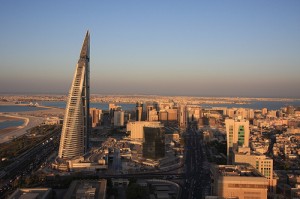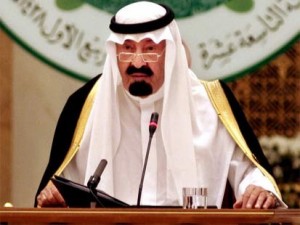Even as mainly Shiite Muslim protesters camp out in Pearl Square demanding major reforms, the deciding factor in the outcome for Bahrain could be neighboring Saudi Arabia.
Behind the scenes and away from the streets, Saudi Arabia, a key U.S. ally and top oil supplier, is seeking to return to the status quo in Bahrain - or at least to slow down calls for change. That Bahrain’s Shiite majority could gain more rights and powers from the ruling Sunni Muslims, Saudis think, could lead to unrest among their own Shiites, who live in Saudi Arabia’s oil-rich Eastern Province. In that case, reforms and economic incentives might not be enough to stop a movement from spreading there.
Bahrain is the first Persian Gulf country to be hit by the unrest that’s sweeping the Middle East, and Saudi Arabia is one of the last U.S. allies in the region since the regimes in Egypt and Tunisia fell. Although Bahrain is a tiny island of less than a million, what happens here could unleash calls for change in the much larger and powerful Saudi Arabia. It’s a case of Goliath fearing David’s wrath.
At stake are oil prices, which are now at their highest since October 2008, and even relations with the United States, which is walking a fine line between promoting the will of the people and supporting a longstanding ally.
In Saudi Arabia, officials already have quashed several small attempts to launch protests against some government decisions. Three days after the revolt began in Egypt, for example, roughly 50 residents protested the government response to deadly floods in Jeddah. They were promptly arrested.
Protesters in Manama are calling for Bahrain to become a constitutional monarchy, rather than an absolute one. Such a shift probably would give the Shiite majority more power. As the Saudis see it, that represents instability for them; Saudi Arabia’s Shiite minority could then rise up and ask for more freedoms its own.
Protesters in Manama threatened Wednesday to lash out at the Saudi regime if it thwarted their efforts, though they refused to give their names.
“If they stop us, we will go there,” one protester yelled.
For Saudi Arabia, the best outcome in Bahrain is enough change to pacify protesters but not so much that it risks government structure, said James Denselow, a Middle East writer and former researcher for Chatham House, a policy research center in London.
“Instability could not get more on Saudi’s doorstep than Bahrain,” Denselow said. “The outcome that Saudi Arabia wants is … for everybody to leave the streets and that small changes be managed by the elite. They want a slow process.”
As with much of what happens in Bahrain, Saudi influence occurs under a veil of secrecy. But there have been some telling signs of the scale of Saudi impact. Bahraini King Hamad bin Isa al Khalifa left the country Wednesday for the first time since the unrest began to meet his Saudi counterpart, King Abdullah, who had just returned home hours earlier after three months of medical treatment in the U.S. and recovery in Morocco. Observers said they think that the Bahraini king consulted with the Saudis over what to do next.
Earlier in the week, the Saudi Council of Ministers said in a statement: “The kingdom will stand by the sisterly state of Bahrain with all its capabilities,” which some Shiites in Bahrain interpreted as a threat to send military aid.
Many think that Saudi influence - coupled with a sizable minority here that has benefited from a Bahrain guided by Saudi Arabia - will thwart efforts for major reform, even as crowds remain camped out at Pearl Square, the main demonstration site. Bahrain’s crown prince has called for national dialogue, but neither the government nor the Shiite opposition groups have codified their positions, and discussions have yet to get under way.
Instead, the Bahraini monarchy said it had released 308 political prisoners since Tuesday; opponents said 12-year-olds were among them, and many of them joined protesters at Pearl Square.
On Wednesday, before King Abdullah landed back in Saudi Arabia, the Saudis announced that they will spend billions of dollars on economic aid to help their more impoverished citizens buy homes and start businesses in an attempt to keep protests from rising in the kingdom. Two weeks ago, the Saudis gave nearly $3,000 to every family in the country.
The Bahraini economy, which generates roughly $25 billion of gross domestic product annually, depends equally on tourism, the government, industry and financial services. Three of those four sectors account for around three-fourths of the GDP, and they’re directly or indirectly tied to Saudi Arabia. Saudis invest in Bahraini banks to conduct finances outside the watchful eye of the regime; Saudi Arabian oil revenues fund the Bahraini government; and three-day jaunts of escapism are key to Bahraini tourism.
“Saudi Arabia is not just a big neighbor to the west; it is safe to say that they have had a major influence on the economic development of Bahrain. The operating budget of the government is mostly oil related, 75 percent of which is of Saudi origin,” said a Western official here, speaking only on the condition of anonymity in order to be more candid. “That buys them a certain amount of influence.”
There are important social impacts as well. Many call Bahrain Saudi Arabia’s Las Vegas.
As soon as some Saudi women, who are banned from driving in their home country, enter Bahrain on the King Fahd Causeway, they jump into the driver’s seat. They take themselves to places such as the Arabic disco on the top floor of the Riviera hotel and pay hundreds of dollars to sit freely in Islamic garb and enjoy cold beers. Scantily clad women greet Saudi men at another bar downstairs.
Three days later, the Saudis whisk themselves over the bridge again and back into one of the most conservative societies in the world.
But Bahrain, the Saudis’ much-needed release valve, now has closed off. Traffic along the causeway between the countries has dropped dramatically, Bahraini officials who work on the border said, and businesses that cater to Saudis said their dealings had come virtually to a standstill. Indeed, supporters of the regime said the economic impact was a big reason to stop the protests.
Riviera hotel manager Mohammed al Shihab said that usually 50 percent of his patrons were Saudis. But only a handful of his 65 rooms are occupied these days. There are no reservations at the Arabic disco, just four fully stocked refrigerators of beer and refreshments. At the Sweetheart bar downstairs, four women in strapless dresses smoked hookahs and waited for the men who never arrived.
These days, Shihab said, he’s closed the Arabic disco altogether: “I can’t keep a disco open for four people.”
He said he wished the protests would stop; Bahrain can’t afford it.
“Now there is no life here,” he said. “Everybody is losing.”
By NANCY A. YOUSSEF





















